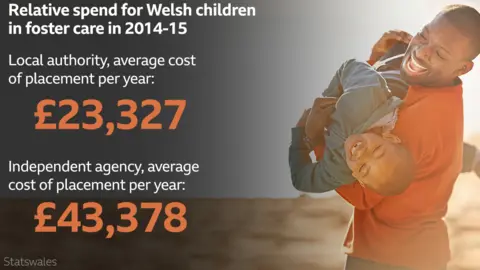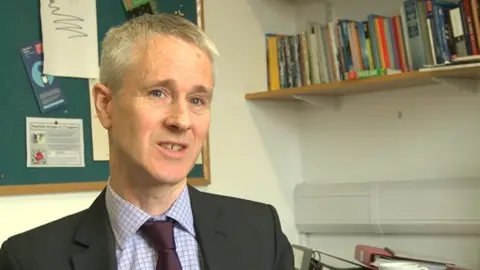Child's care placement costs Welsh council £16k a week
One child's care placement is costing a Welsh council £16,000 a week, BBC Wales has learned.
The latest figures show Welsh councils' overall spend on looked-after children trebled from £76m in 2001-02 to £256m this year.
Welsh Local Government Association said it was due to increased demand, complex care needs and out-of-area placements.
A report to Wales' Public Accounts Committee said it was "becoming unsustainable".
The Welsh Government said local authorities were helping to deliver a wide range of prevention and early intervention programmes to address the problems.
Welsh councils have seen their annual spends on looked-after children's services grow by 80%-600% since 2001-02, before inflation is taken into account.
Cardiff council, which spends the most in Wales, saw its costs rise by 388% from £8.5m in 2001-02 to £41.5m in 2016-17.
Swansea council, which has the second largest looked-after children bill, witnessed a 250% rise in that time, from £6.7m to £23.5m.
Meanwhile, Torfaen's annual spend rose from £1.4m to £10.1m - a six-fold increase.
Stewart Blythe, policy officer at the WLGA, put the rise in children needing care, and the complexity of their needs, down to "austerity and financial challenges, increasing poverty and welfare reform".
He said: "There is growing awareness of child sexual exploitation and the issues in themselves are very complex.
"Local authorities are finding it a challenge to support them and meet their needs which results in them being placed outside local authority care.
"For some children, their needs are so complex there's a real dearth of placements. In some situations they end up being placed further away than you would like."

 GETTY/BBC
GETTY/BBC
Mr Blythe said one local authority in Wales commissioned "a bespoke placement in the region of £16,000 a week" because it was struggling to find anyone to meet the child's needs.
"With austerity, you only need one or two children with very complex needs and your budget goes out of the window," he said.
Mr Blythe said councils were trying to intervene earlier, but they were struggling to invest at a time of reduced budgets and increased demand.
A report to the Welsh assembly's public accounts committee inquiry into care experienced by children and young people, found most local authorities were anticipating significant overspends on their children's services budgets this year.
It included evidence from the WLGA, ADSS Cymru and the National Adoption Service.

Jonathan Scourfield, professor of social work at Cardiff University, said another reason for the rise in numbers was "a more risk-averse climate where both the public and professionals are more likely to refer children if they have got concerns, to play on the safe side".
Prof Scourfield added: "Undoubtedly, as a society we would want to prevent these problems getting worse rather than waiting until they get to such a crisis point a child needs to be removed from their family, which is quite an extreme measure to take.
"There's a risk the threshold has become slightly too low."
He said it was "entirely understandable" councils took this approach because of the "political furore" when something goes wrong.
"I think in that climate there's a tendency for councils to be risk-averse and perhaps, as a society, we need to give them a mission to live with some more risk in the interests of keeping children in families where possible," he added.
But Jackie Sanders, of the Fostering Network, said the increase in the money spent by councils was not necessarily a negative.
"Foster care is vital in transforming children's lives and if this money is being well spent, benefitting children in care and meeting their needs, then this can only be a good thing," she added.
However, she said the charity was "concerned" about the impact of austerity on councils' ability to "go the extra mile" as "corporate parents" in the future.
A Welsh Government spokesman said: "We recognise the increase in numbers of children coming into contact with children's services places additional pressures on local authorities and have prioritised funding for social care in the provisional settlement for next year.
"Local authorities are helping to deliver a wide range of prevention and early intervention programmes which aim to help families stay together where appropriate, and ultimately reduce the numbers of children coming into the care system."
